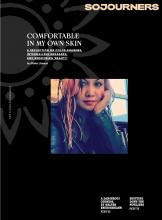AMERICA'S OPENNESS TO refugees has been a distinct feature of our country from its foundation. Our nation was established by communities facing discrimination elsewhere for their religious practices. In the periods when the country was not open to refugees and asylum seekers, such as during the Holocaust, it later became clear that we were on the wrong side of history.
The Trump administration announced this fall an annual admissions ceiling of 18,000 refugees for the next fiscal year, its third straight year of drastic reductions and a historic low. By comparison, almost 85,000 refugees were admitted in President Obama’s last year in office. Trump’s actions come at a time when the number of people fleeing conflict around the world is the highest since World War II.
Faith-based organizations in the United States have been at the forefront of refugee resettlement. The Trump administration decision threatens the already precarious structures around resettlement, which are largely religiously based. For many, the scriptural obligation to care for the stranger is a core religious belief. By having this capacity for service undercut, in many ways the faithful—across the spectrum from conservative to progressive—are unable to fulfill their religious obligations for care. The administration’s refusal to engage the many faith-based leaders and organizations who called for more, not less, openness to welcoming refugees decries its alleged commitment to religious freedom.
Read the Full Article

